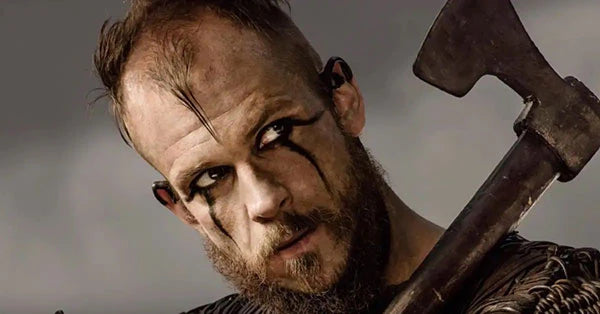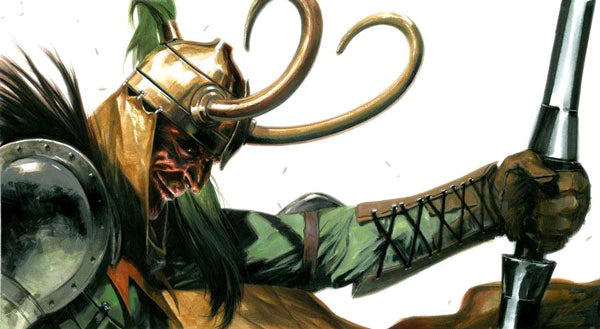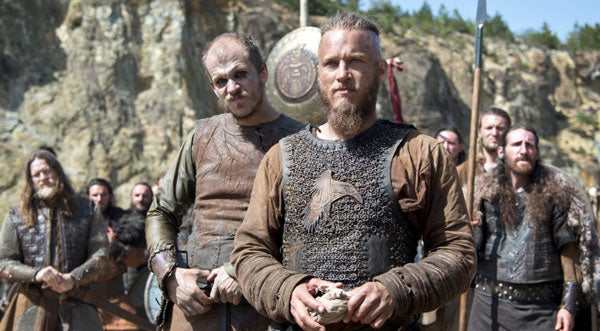🎁 Enjoy 10% off with code VIKING10
🎁 Enjoy 10% off with code VIKING10
Floki
March 26, 2023 7 min read

Floki Vilgerðarson | The explorer who discovered Iceland!
The Vikings, these warriors that nothing and nobody can stop, are also known to be great explorers. They have always been outstanding sailors and navigators. Many Vikings have sailed all the seas, and have forever shaped the history of humanity. One of these iconic Viking explorers is none other than Floki Vilgerðarson.
Floki is one of the greatest navigators the Viking civilization has ever known. A powerful warrior, a keen explorer and a revolutionary ship designer, Floki quickly became a Viking of renown. He remains a key Viking figure to this day.
To find out how this Viking became a true legend, we reveal in this article the true story of Floki Vilgerðarson. Get ready to discover the origins of this Viking hero!
The story of Floki Vilgerðarson: did he really exist?

Floki Vilgerðarson really existed, and his story is told in a historical work that describes the discovery and colonization of Iceland "the Landnámabók". Unfortunately, little is known about the origin and the beginnings of Floki.
The only known historical facts about Floki, apart from the account of his exploration of Iceland, are :
- The circumstances of his birth: Floki would have been born around the year 830 AD in Norway;
- The name of his parents: his father was called "Glamur" while the full name of his mother would have been "VilgerdHörða-Káradóttir";
- He has royal blood: according to some sources, he is the descendant of a fallen dynasty of jarls. She is from the Norwegian province of Hedemark.
The character of Floki became very popular thanks to the series "Vikings". However, the series is only partly inspired by these historical facts to give life to this mythical Viking personality. There are many differences between the real Floki and the one in the series.
To help you sort out what is fiction and what is reality about Floki Vilgerðarson, we tell you the surprising story of this Viking navigator.
The origin of the name "Floki Vilgerðarson" or "Hrafna-Flóki
Floki's name "Vilgerðarson" is a matronym, which means that it was passed on to him by his mother. "Vilgerðarson" would be the combination of Loki's mother's name "Vilgerð" and the suffix "arson" which means son. Thus, Vilgerðarson can literally be translated as "Vilgerd's son".
As for Floki's nickname "Hrafna", he acquired it during his expedition to Iceland. According to some accounts, he would have been equipped with 3 ravens to carry out this voyage towards this icy land. It is at this time that one gives him the honorary title of "Hrafna Floki" which means in old Norse "Floki with the raven" or "Masters of the ravens".
In the Viking civilization, the raven symbol is sacred. This title has a very special meaning. It honors its holder and means that he would :
- A Viking close to the gods: in Viking folklore, ravens are one of the symbols of Odin. His two ravens, Hugin and Munin, watch over the nine worlds and are Odin's eyes and ears. Hugin represents thought, while Munin is a metaphor for "memory";
- A person who can guide lost souls: the ravens that fly over the battlefields guide the souls of the Vikings towards Valhalla. Floki, on the other hand, guides his comrades to a new and more fertile land, and would thus be similar to the raven.
Is Floki inspired by the god Loki?

There is no doubt that Floki was very intelligent. After his family was dethroned from the power of the Hedemark region, he wanted to find a new land for himself and his people. So he set out to build a brand new type of Viking ship. His final creation will be a boat that can both withstand the roughest seas, and cross the narrowest rivers.
His intelligence, quick thinking and sometimes even cunning have earned him many comparisons to the god Loki. This is especially true since in the Vikings series, Floki is endowed with mystical powers. For many fans, Floki would be a god, but not just any god: he would be the god Loki!
This theory, very popular among fans of the series, unfortunately has no historical basis. Indeed, the name "Floki" does not come from "Loki", despite their similarities. It means "heroic Viking" in Old Norse.
The history of Floki according to the "Landnámabók
The Landnámabók means "The book of the colonization". It tells the story of the discovery and colonization of Iceland by the Scandinavians. On the list of great Viking explorers who colonized Iceland is the name of Floki Vilgerðarson.
It is in this manuscript that we discover that during his expedition, Floki took with him all his family. Indeed, Floki was accompanied by his wife and his two children. This one was well and truly alive, and was called "GróBjornsdottir". As for his two children, they were named Oddleifur and Þjóðgerður.
In the Landnámabók, Floki knew exactly where he was going: an unexplored island far north of Midgard. His main reason for going there is :
- The hope of a better life away from a Viking kingdom in peril;
- The promise of fertile and cultivable land for his family and all his companions;
- A new beginning for these Vikings exhausted by wars.
In contrast to the Vikings series, it is only after he loses his wife "Helga" that he decides to go on this blind expedition. Nothing holds him back in Kattegat, and he trusts the Viking gods to guide him to a new destiny!
However, in both versions of the story, he uses ravens to show him the direction of the land. Whether in sorrow or in necessity, Floki remains a very ingenious and surprising character.
The discovery of Iceland by Floki
The discovery and colonization of Iceland is one of the best documented events of the Viking Age. There are two major historical sources:
- The Landnámabók: it is a manuscript which relates in detail the colonization of Iceland. It was written between the end of the 9th century and the beginning of the 10th century. It not only recounts the discovery of Iceland, but also lists all the settlers, including Floki and his companions.
- The Íslendingabók: This book is mostly taken from the Landnámabók. It means in Old Norse "The book of the Icelanders". It was written around the 12th century, and tells mainly about the Christianization of Iceland.
In addition to Íslendingabók, there are four other versions of Landnámabók that tell the story of Floki Vilgerðarson.
The first Viking pioneers
Floki Vilgerðarson is not the first Viking explorer to discover Iceland, but actually the 3rd. Indeed, the very first explorer to have discovered this new land was a Norwegian Viking named Naddodd. In the year 830, during an expedition to the Faroe Islands, located between Norway and Iceland, Naddodd gets lost at sea and goes further than expected.
His incredible journey leads him to an unknown land, which he names "Snaeland" or "land of snow". He landed on the east coast of this island and spent a year there before returning to Norway. This region is now called "Reyðarfjörður".
Several years after Naddodd's chance discovery, a second Viking tried to find this virgin land. In the year 860, Garðarr or Gardar Svavarsson sailed around the land and discovered that it was actually an island separated from the world by the sea on all sides. He renamed it "Garðarshólm", which means "Gardar's island" in Old Norse.
On his way back, Gardar dropped off a Viking named Nattfari with his entire family north of Garðarshólm. They are the first settlers of Iceland!
Floki and the name of Iceland
It is only in the year 868 that Floki Vilgerðarson sets out to discover Garðarshólmi. Not knowing the exact location of this mysterious island, he takes with him three ravens to better guide him and act as scouts.
Floki could not mount this expedition alone. He needed a crew, but could not afford one. All he had to look forward to was a virgin land, fertile and free. So Floki, along with his wife and children, embarked on this journey accompanied by other Vikings such as :
- Thorolf (Þórólfur) is a farmer who can no longer provide for his family. The changes in the region have affected his business and his source of income;
- Herjof and Faxe (Herjólfur and Faxi): two men exiled from the big cities. They wanted to escape the war that raged between the Viking and Christian religions.
After passing the Faroe Islands, Floki frees one by one the three crows he brought back with him:
- The first one, does not even leave the boat and immediately turns around, returning to their starting point;
- The second one flew away in the direction of the Faroe Islands and finally came back to the boat, without much help;
- The third raven was the right one. He flew to Garðarshólmi or Snaeland and directed them to their destination!
After sailing a long distance to the west, Floki and his crew see land. It is a bay that will be named "Faxafloi" in honor of Faxe, which means Faxe's bay.
Floki Vilgerðarson and all his companions set up camp on the east coast of this island. Only, the winter is harder than expected and Floki finds himself stuck in the snow and ice. Frustrated, he gives it the name of "Iceland" which means "land of ice". He is the first Viking explorer to spend such a long period in Iceland.
The return to Norway and the death of Floki
Neither Floki nor his crew were prepared for the harsh winter that awaited them in Iceland. As soon as the weather became milder, they returned to their home country Norway to prepare a new expedition.
The news of the discovery of Iceland spread very quickly. When asked, Floki always answers that it is a poor and uninteresting land. But his companions Herjof and Faxe compare Iceland to a plain in the kingdom of the Asgard gods "Idavoll".
Floki Vilgerðarson returned to Iceland shortly afterwards to spend the rest of his life with his family. It was around this time, in the year 874, that the first expeditions of Viking settlers to populate Iceland began.
Did Floki and Ragnar Lothbrok know each other?

Floki is one of the fan-favorite characters in the Vikings series. To the dismay of fans, Floki has certainly not met Ragnar Lothbrok and even less his sons. Indeed, the legendary Viking king Ragnar would have died around the year 840, while Floki was only born in the year 830.
In addition to this, the historical and legendary sources that tell of the exploits of Ragnar and his sons do not mention Floki or his eventual meeting at any time. Whether in Ragnars saga loðbrókar or in the Gesta Danorum, Floki is a great absentee.
All this means that Floki was never Ragnar's most faithful companion. He never sailed with Björn I to the Mediterranean and even less helped Lagertha or Ivar the Boneless in their wars and fights.
The historical facts belie these facts, and give more value and merit to the expedition that Floki leads in Iceland. By his ingenuity, he succeeded, alone, to become a great navigator in spite of the constraints and the absence of resources. He was able to carry out all his adventures successfully.
Leave a comment
Comments will be approved before showing up.
Also in viking

Legendary Blades: The Most Fascinating Swords in Mythology and Literature
January 30, 2026 6 min read


![Create Your Own Medieval Fashion [Guide]](http://www.vikingheritage.net/cdn/shop/articles/Create_Your_Own_Medieval_Fashion_Guide_1600x.png?v=1769768001)
